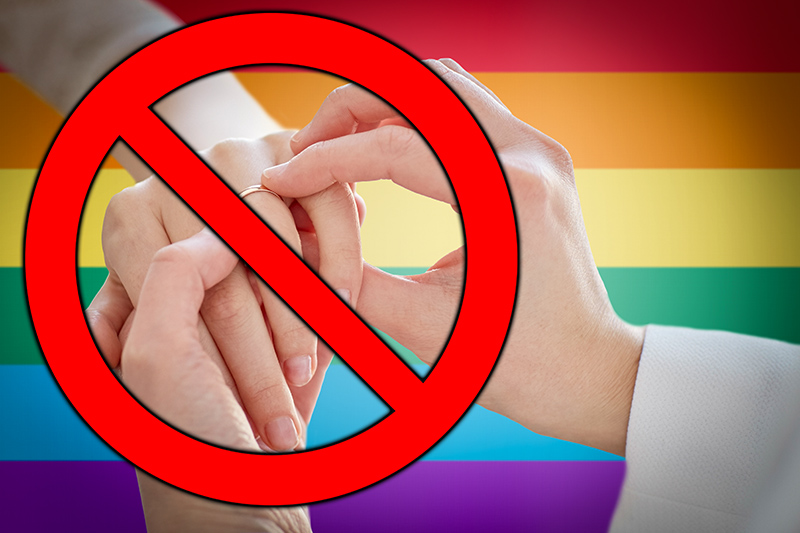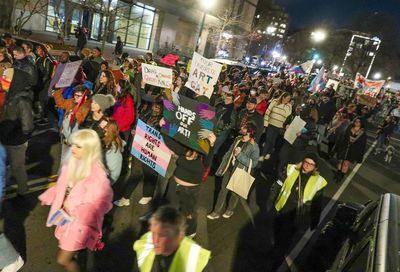Supreme Court Justices Thomas and Alito call for overturn of marriage equality
Justices claim same-sex marriage violates religious liberty and the court bypassed the democratic process in its 2015 decision
By John Riley on October 5, 2020 @JRileyMW

Two U.S. Supreme Court justices have called for the overturning of same-sex marriage laws, after the court rejected an appeal from Kim Davis, the Kentucky clerk who refused to issue same-sex marriage licenses back in 2015 due to her personal religious beliefs opposing homosexuality.
On Monday, the Court rejected an appeal from lawyers representing Davis, after a lower court decision found that some of the couples who had been denied licenses had a right to pursue a lawsuit against her.
In their dissent, Justices Samuel Alito and Clarence Thomas argued that the court had bypassed the democratic process in its 2015 Obergefell decision which legalized marriage equality nationwide.
Davis, the former clerk for eastern Kentucky’s Rowan County, refused to issue licenses to any couple, straight or gay, until the commonwealth allowed her to remove her name and title from any licenses issued by her office, lest she be seen as “endorsing” same-sex marriage. (The legislature later removed clerk’s names and titles from all marriage licenses issued in the commonwealth.)
Her lawyers argued that the lawsuit — brought against Davis by two straight couples and two gay couples who were unable to obtain licenses from her office — should be dismissed on the grounds that she, as a public servant acting on the government’s behalf, was shielded from civil lawsuits under a legal doctrine known as qualified immunity. But a federal judge found that the couples could proceed with their lawsuit, a finding that was upheld by the 6th U.S. Circuit Court of Appeals.
Because the Davis case was not a “clean vehicle” for challenging the Supreme Court’s 2015 decision in Obergefell v. Hodges, in which the court overturned all bans on same-sex marriage, Thomas and Alito agreed with their fellow justices that Davis’s appeal should be dismissed. That means the lawsuit against her will be allowed to move forward.
But Thomas, joined by Alito, penned a scathing dissent arguing that the Supreme Court had overstepped its bounds in 2015.
“In Obergefell v. Hodges, the Court read a right to same-sex marriage into the Fourteenth Amendment, even though that right is found nowhere in the text,” Thomas wrote. “Several members of the Court noted that the Court’s decision would threaten the religious liberty of the many Americans who believe that marriage is a sacred institution between one man and one woman. If the States had been allowed to resolve this question through legislation, they could have included accommodations for those who hold these religious beliefs. The Court, however, bypassed that democratic process.
“Worse still, though it briefly acknowledged that those with sincerely held religious objections to same-sex marriage are often ‘decent and honorable,’ the Court went on to suggest that those beliefs espoused a bigoted worldview. The dissenting Justices predicted that ‘[t]hese . . . assaults on the character of fairminded people will have an effect, in society and in court,’ allowing ‘governments, employers, and schools’ to ‘vilify’ those with these religious beliefs ‘as bigots,'” Thomas continued, quoting from Alito’s dissent in the Obergefell case. “Those predictions did not take long to become reality.”
See also: Indiana Republican senator faces backlash for statements on same-sex marriage and parenting
Thomas and Alito’s dissent casts Davis as a martyr for religious liberty, writing: “Davis may have been one of the first victims of this Court’s cavalier treatment of religion in its Obergefell decision, but she will not be the last.” They contend that those with sincerely-held beliefs opposing same-sex marriage will find it “increasingly difficult to participate in society without running afoul of” the court’s decision in Obergefell.
“It would be one thing if recognition for same-sex marriage had been debated and adopted through the democratic process, with the people deciding not to provide statutory protections for religious liberty under state law,” Thomas’s dissent continues. “But it is quite another when the Court forces that choice upon society through its creation of atextual constitutional rights and its ungenerous interpretation of the Free Exercise Clause, leaving those with religious objections in the lurch.”
Thomas’s dissent also bemoans the fact that some people have labeled opponents of same-sex marriage as “bigots” because of their refusal to amend their religious beliefs to fit prevailing views of marriage as a constitutional right for LGBTQ people.
“By choosing to privilege a novel constitutional right over the religious liberty interests explicitly protected in the First Amendment, and by doing so undemocratically, the Court has created a problem that only it can fix,” the dissent concludes. “Until then, Obergefell will continue to have ‘ruinous consequences for religious liberty.'”

The stated desire of at least two of the court’s justices to overturn same-sex marriage laws highlights the urgency of the coming fight over the nomination of Amy Coney Barrett to replace the recently deceased Justice Ruth Bader Ginsburg, part of the court’s liberal wing, given Barrett’s embrace of an “originalist” or “textualist” view of the law.
The Human Rights Campaign denounced the justices’ dissent in a statement while warning that the confirmation of Barrett would potentially threaten same-sex marriage rights for the next two generations.
“This morning, Justices Thomas and Alito renewed their war on LGBTQ rights and marriage equality, as the court hangs in the balance,” HRC President Alphonso David said in a statement. “The language related to this denial of certiorari proves yet again that a segment of the Court views LGBTQ rights as ‘ruinous’ and remains dead set against protecting and preserving the rights of LGBTQ peoples.”
David warned that a 6-3 conservative majority on the Supreme Court would likely “water down” marriage rights for same-sex couples by allowing exemptions that would deny them legal status, refuse them certain legal rights, such as medical decision-making, or allow businesses to actively deny goods or services to them
“Our love is valid, our love is equal, and our rights must be,” David added. “Amy Coney Barrett has openly claimed to hold similar views to Scalia, who Thomas and Alito channel with this opinion. That fact, along with Barrett’s ties to anti-equality extremist groups who aim to criminalize LGBTQ relationships in the United States and abroad, shows that Barrett will only embolden these anti-equality extremist views on the Court.”
The American Civil Liberties Union also blasted the justices’ dissent.
“It is appalling that five years after the historic decision in Obergefell, two justices still consider same-sex couples less worthy of marriage than other couples,” James Esseks, the director of the ACLU’s LGBT & HIV Project, said in a statement.
“When you do a job on behalf of the government — as an employee or a contractor — there is no license to discriminate or turn people away because they do not meet religious criteria. Our government could not function if everyone doing the government’s business got to pick their own rules,” Esseks continued. “That’s exactly what’s at stake in a case that will be argued on Nov. 4 — Fulton v. City of Philadelphia. We will fight against any attempts to open the door to legalized discrimination against LGBTQ people.”
Read more:
Transgender Texas teen says she’s been banned from school until she adheres to male dress code
Gay Twitter has taken over the Proud Boys hashtag, and it’s beautiful
Supreme Court Could Pave Way for Return of Conversion Therapy
The Supreme Court will hear a challenge to Colorado's conversion therapy ban and could strike down similar bans across the nation.
By John Riley on March 11, 2025 @JRileyMW
The U.S. Supreme Court has agreed to take up a challenge to a Colorado law prohibiting mental health therapists from subjecting LGBTQ youth to conversion therapy.
The court will hear the case during its next term, which begins in October and runs through June 2026.
Conversion therapy is a practice intended to change a person's sexual orientation or gender identity to align with heterosexual or cisgender norms. Most mainstream medical organizations have largely discredited it as ineffective and potentially even harmful.
Yet, many social conservatives insist that people who hold religious beliefs opposing homosexuality should be allowed to enroll their children, or, in the case of adults, themselves, in the practice.
Judge Blocks Transfer of Trans Inmates to Men’s Prisons
A dozen transgender inmates requested an injunction stopping their transfer, claiming it would put them at risk of physical violence.
By John Riley on February 26, 2025 @JRileyMW
Defying an executive order from President Donald Trump, a federal judge blocked the U.S. Department of Justice from transferring 12 transgender female inmates to male prisons.
The Bureau of Prisons was slated to relocate the inmates to comply with a Trump executive order stating that the U.S. government will only recognize two sexes, male and female, as valid.
That executive order also pledged to ban people assigned male at birth from accessing female-designated spaces, including single-sex accommodations in prisons.
The executive order also prohibits federal funds from being used for any medical treatment, procedure, or drug that would assist an inmate in transitioning or changing their outward appearance in a way that would not align with their assigned sex at birth.
Republicans in 9 States Push to Overturn Gay Marriage
Republican lawmakers in nine states are either calling for the overturn of gay marriage or seeking to undermine it.
By John Riley on February 27, 2025 @JRileyMW
Republicans in nine states are calling for the overturn of marriage equality.
In Idaho, Michigan, Montana, North Dakota, and South Dakota, lawmakers have introduced resolutions demanding the U.S. Supreme Court reverse its landmark 2015 decision in Obergefell v. Hodges, in which the court struck down all existing state-level same-sex marriage bans.
Last month, the Idaho House of Representatives voted 46-24 to approve one such resolution, asking the nation's highest court to "restore the natural definition of marriage, a union of one man and one woman."
While the resolution is non-binding and doesn't require the Supreme Court to take action, Republican lawmakers see it as a "messaging" bill that expresses their extreme displeasure with same-sex marriage.
Support Metro Weekly’s Journalism
These are challenging times for news organizations. And yet it’s crucial we stay active and provide vital resources and information to both our local readers and the world. So won’t you please take a moment and consider supporting Metro Weekly with a membership? For as little as $5 a month, you can help ensure Metro Weekly magazine and MetroWeekly.com remain free, viable resources as we provide the best, most diverse, culturally-resonant LGBTQ coverage in both the D.C. region and around the world. Memberships come with exclusive perks and discounts, your own personal digital delivery of each week’s magazine (and an archive), access to our Member's Lounge when it launches this fall, and exclusive members-only items like Metro Weekly Membership Mugs and Tote Bags! Check out all our membership levels here and please join us today!
The Magazine
-
Most Popular
 Gay Army Reserve Officer in Uniform Sex Video Scandal
Gay Army Reserve Officer in Uniform Sex Video Scandal  Charges Dropped in Nancy Mace Assault Case
Charges Dropped in Nancy Mace Assault Case  Greece to Ban Surrogacy for Gay Male Couples
Greece to Ban Surrogacy for Gay Male Couples  Gay Porn Star Tim Kruger Dead at 44
Gay Porn Star Tim Kruger Dead at 44  Conversion Therapist Sexually Abused Male Clients
Conversion Therapist Sexually Abused Male Clients  'Glengarry Glen Ross' Is An Abusive Night of Theater
'Glengarry Glen Ross' Is An Abusive Night of Theater  'Porn Star University' Started by Gay-for-Pay Creator Andy Lee
'Porn Star University' Started by Gay-for-Pay Creator Andy Lee  Trans Sex Worker Kills Client After He Demands Money Back
Trans Sex Worker Kills Client After He Demands Money Back  Public Health Nightmare: CDC Shuts STI Lab, Fires Its Scientists
Public Health Nightmare: CDC Shuts STI Lab, Fires Its Scientists  Russia Bans the Elton John AIDS Foundation
Russia Bans the Elton John AIDS Foundation
 Charges Dropped in Nancy Mace Assault Case
Charges Dropped in Nancy Mace Assault Case  Gay Army Reserve Officer in Uniform Sex Video Scandal
Gay Army Reserve Officer in Uniform Sex Video Scandal  WATCH: Ad Attacks Senator Over Trans Athlete Vote
WATCH: Ad Attacks Senator Over Trans Athlete Vote  John Grant Happily Talks About Everything and Everyone
John Grant Happily Talks About Everything and Everyone  Conversion Therapist Sexually Abused Male Clients
Conversion Therapist Sexually Abused Male Clients  Public Health Nightmare: CDC Shuts STI Lab, Fires Its Scientists
Public Health Nightmare: CDC Shuts STI Lab, Fires Its Scientists  Win Tickets to DeathbyRomy
Win Tickets to DeathbyRomy  Broadway's Grand and Glorious 'Purpose'
Broadway's Grand and Glorious 'Purpose'  'Glengarry Glen Ross' Is An Abusive Night of Theater
'Glengarry Glen Ross' Is An Abusive Night of Theater  Greece to Ban Surrogacy for Gay Male Couples
Greece to Ban Surrogacy for Gay Male Couples
Scene
Metro Weekly
Washington's LGBTQ Magazine
P.O. Box 11559
Washington, DC 20008 (202) 638-6830
About Us pageFollow Us:
· Facebook
· Twitter
· Flipboard
· YouTube
· Instagram
· RSS News | RSS SceneArchives
Copyright ©2024 Jansi LLC.










You must be logged in to post a comment.